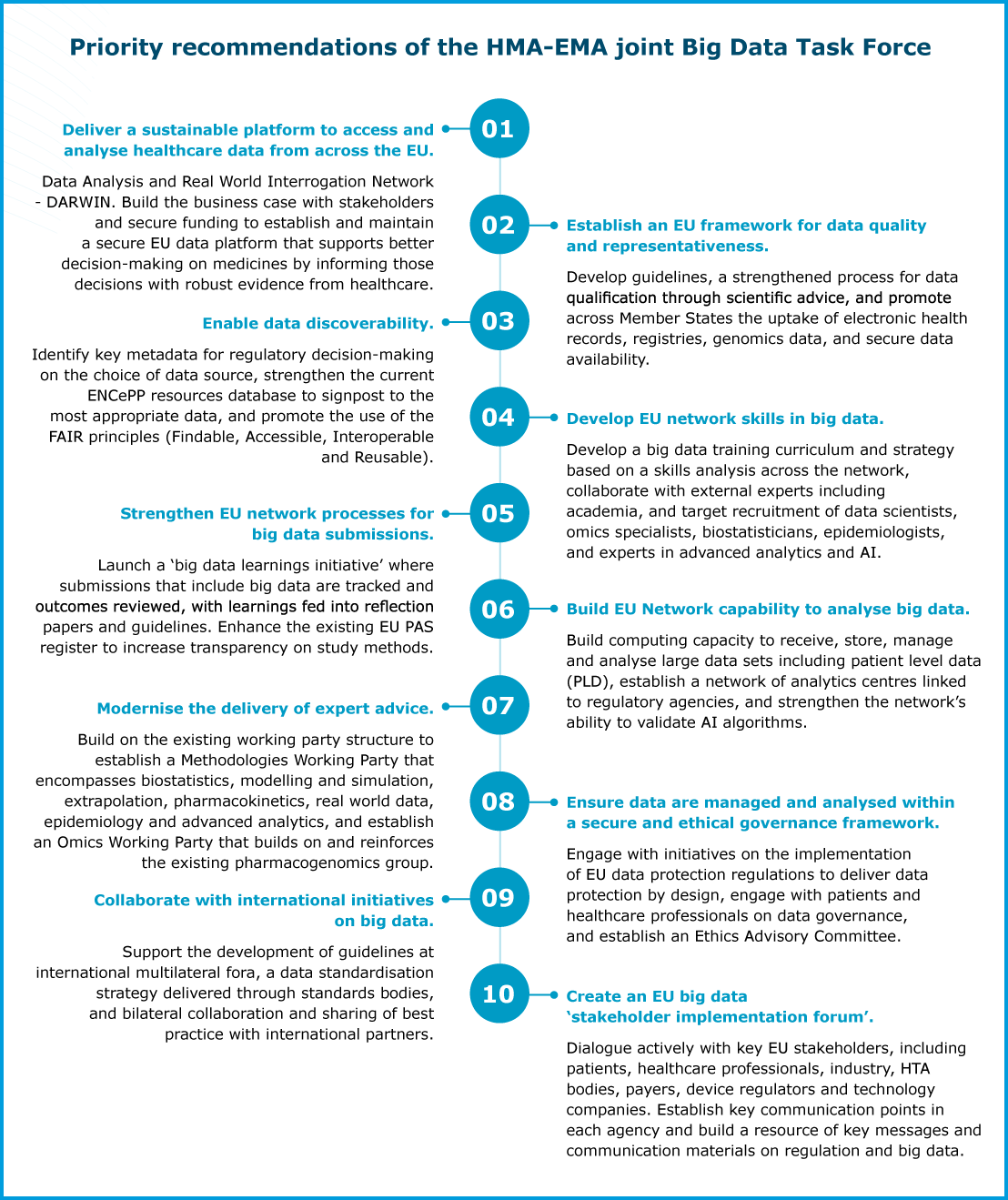
A decisive year for big data in medicines regulation: towards data-driven decision-making
In 2019, EMA and NCAs took major steps towards unlocking the potential of big data for medicines regulation in the EU. The joint HMA/EMA Big Data Task Force, which is composed of experienced medicines regulators and data experts appointed by the national competent authorities, EMA and the European Commission, worked intensively throughout the year, leading to concrete recommendations on steps the European medicines regulatory network could take to evolve its approach on how to use evidence from big data for regulatory decision-making.
Massive amounts of data are generated daily through wearable devices, electronic health records, social media, clinical trials or spontaneous adverse reaction reports. To complement the evidence from clinical trials and fill knowledge gaps regarding a medicine, insights derived from this data will increasingly be used by regulators to assess the benefits and risks of medicines across their whole life cycle. However, in order to benefit from and make prudent use of the data collected, regulators recognised they need to better understand the data landscape and identify the optimal analytical methods.
In phase one of its work, the HMA/EMA Big Data Task Force published a report in February 2019 which reviewed the big data landscape from a regulatory perspective and identified opportunities for improvements in the operation of medicines regulation. This report also included surveys of national regulatory agencies and the pharmaceutical industry on their perspectives, available expertise and possible obstacles. This helped to develop an understanding of the challenges and the current state of expertise in the regulatory network. The report, on which stakeholders were invited to comment, provided for the first time a definition of big data in medicines regulation:
Big data are ‘extremely large datasets which may be complex, multidimensional, unstructured and heterogeneous, which are accumulating rapidly, and which may be analysed computationally to reveal patterns, trends and associations. In general, big data sets require advanced or specialised methods to provide an answer within reliable constraints.’
Having identified the opportunities for improvement, in phase two of its work, the Big Data Task Force focused on mechanisms to achieve this. A second report, which was adopted by EMA’s Management Board in December 2019, identified practical steps to be taken by the European medicines regulatory network to increase its capacity to deal with big data. The task force identified ten priority actions for European regulators, the most ambitious being the establishment of an EU platform to access and analyse healthcare data from across the EU (Data Analysis and Real World Interrogation Network, or DARWIN).
The European medicines regulatory network is now considering how to implement the task force’s recommendations, in consultation with the European Commission. The recommendations will inform strategic decision-making and planning by the HMA and EMA and contribute to the development of the five-year EU Network Strategy to 2025.
Three questions on DARWIN to Peter Arlett, Head of Data Analytics and Methods Task Force at EMA and co-chair of the Big Data Task Force
WHAT IS DARWIN?
The creation of the Data Analysis and Real World Interrogation Network is the top recommendation from the Big Data task force. While the EU is fortunate in the richness of its healthcare data, which stems from universal healthcare coverage, it currently lacks the means to fully exploit it. The proposal is to create a European platform to access and analyse healthcare data of known quality and content using the highest levels of data security. This platform would initially focus on analysing electronic health records to support regulatory decision-making on the benefits and risks of medicines although, over time, it could include other healthcare data including claims and registry data.
WHY IS ITS DEVELOPMENT SEEN AS A PRIORITY BY THE BIG DATA TASK FORCE?
This is because the benefits for public health and stakeholders are very significant. DARWIN could support better regulatory decision-making on medicines by informing those decisions with robust evidence from healthcare. Once a medicine has been authorised, it could support the monitoring of the performance of medicines on the market (both effectiveness and safety). In the context of the authorisation of new medicines, it could complement data from randomised clinical trials with evidence from healthcare practice. With access to such data, regulators will also be able to validate claims made by the pharmaceutical industry through independent analysis and address public health challenges that cut across individual products, such as antimicrobial resistance or the safe and effective use of different classes of medicines.
WHAT ARE THE NEXT STEPS?
The Big Data Task Force has developed an initial business case with concrete proposals to deliver this ambitious project. Together with the HMA Task Force co-chair, Nikolai Brun, I am very grateful for the constructive discussions which took place within the task force and beyond with stakeholder groups. These discussions led to a proposal which balances well the needs of regulators and other decision-makers, both at the national and European level.
We will now need to build on this business case and secure support and resources to establish and maintain DARWIN. There is a need to establish both technology and, importantly, robust governance, including data security. By establishing DARWIN, we can deliver better medicines regulation by using evidence from the delivery of healthcare. The platform could also have benefits for many partners and stakeholders who take decisions that could be informed by such data accessed from across Europe.

